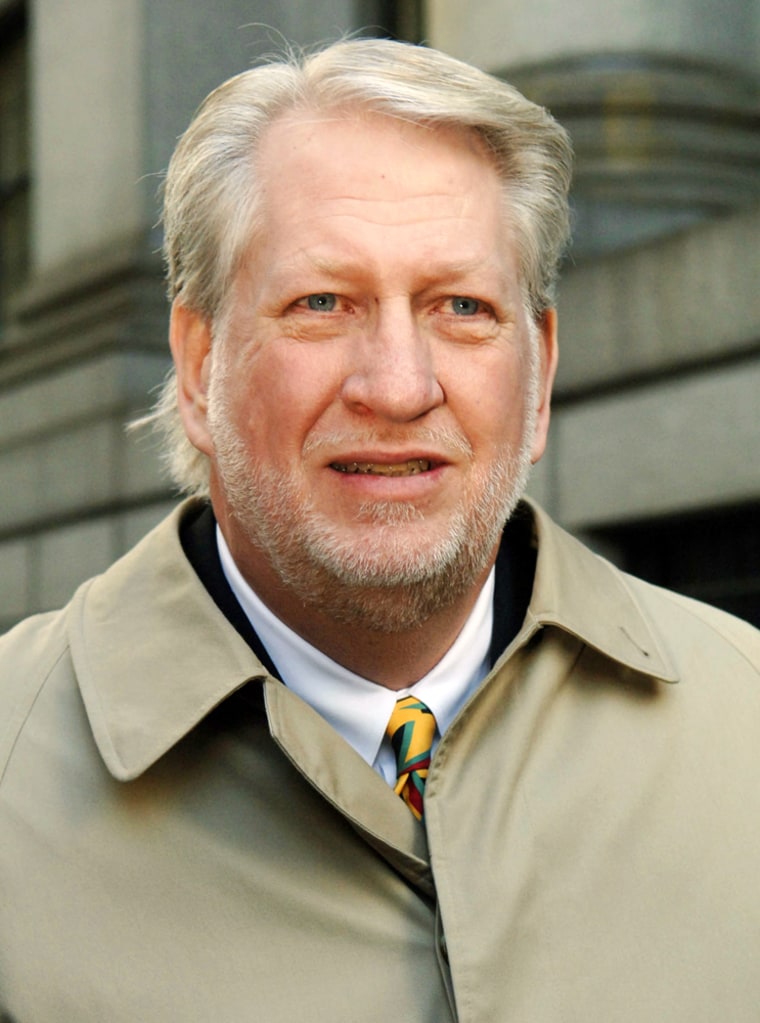The scene said everything about the year in white-collar crime: Bernard Ebbers, the jocular, folksy former boss of WorldCom Inc., hunched forward in a courtroom chair, quietly crying.
He had just been sentenced to 25 years in prison for orchestrating the record $11 billion accounting fraud at the toppled telecom — essentially a life term for a man 63 years old and with a history of heart trouble.
It was a startling punishment, but far from extraordinary in 2005: In the cavalcade of recent corporate scandals, this was the year the hammer finally fell on top executives. Hard.
And the trend toward harsher sentencings for corporate crooks comes just as the curtain goes up on what's expected to be the most complex of the white-collar cases to date, the fraud trial of Enron founder Kenneth Lay and two other former officials.
Set to get under way Jan. 17, the Enron trial brings the corporate crime era full-circle: Enron's crash into bankruptcy in 2001 predates scandals at WorldCom, Adelphia Communications Corp. and Tyco International Ltd.
It also promises to be intriguing: Lay has already mounted a public defense that rivaled Martha Stewart's, including a blitz of television appearances and interviews. He claims he trusted the wrong people and valiantly tried to save the energy giant.
For Lay, former CEO Jeffrey Skilling and former top Enron accountant Richard Causey, the consequences of conviction are dire. Consider the fates met by convicted corporate executives in 2005 alone:
Ebbers' sentence, which followed a trial in which he took the witness stand and flatly denied any knowledge of the massive book-cooking at WorldCom, was the toughest to date in the business scandals.
John Rigas, the white-haired founder of cable giant Adelphia, got 15 years in prison for looting his company. His son Timothy, the former chief financial officer, got 20.
L. Dennis Kozlowski, the former Tyco chief whose $6,000 shower curtain and lavish parties made him almost a caricature of the boomtime CEO, finishes the year in a maximum-security prison that will allow him three showers a week.
He and his own former finance chief, Mark Swartz, will serve at least 8 1/3 years — and perhaps as many as 25 — after they were convicted of stealing $600 million from Tyco.
And former Cendant Corp. Vice Chairman E. Kirk Shelton was slapped with 10 years in prison for his role in an accounting scandal that cost investors and the company more than $3 billion.
For judges considering the staggering harm done to investors and employees of these scandal-scarred companies, the sentences were not close calls, said Eric Chaffin, a securities lawyer at Seeger Weiss LLP and a former white-collar prosecutor in New York.
"The judges, when they really see the real victims and see that there's really strong fraud in these companies, they're going to make somebody pay the price," he said.
Some paid literally. A New York judge signed off on settlement deals that forced investment banks, auditor Arthur Andersen and former WorldCom officials to cough up $6.1 billion, much of it to be divvied among 830,000 investors and institutions who lost money in the accounting fraud.
That settlement included $25 million paid by former WorldCom board members out of their own pockets, and forfeiture of homes owned by Ebbers and former WorldCom finance chief Scott Sullivan.
And investment banks and former directors agreed to pay more than $7 billion in a similar settlement over the Enron collapse, including $13 million paid personally by 10 former board members.
But the year was not without at least one high-profile setback for government prosecutors, who had run up a winning streak worthy of the Harlem Globetrotters in securing guilty pleas and convictions in their crackdown on corporate crime.
In June, HealthSouth Corp. founder Richard Scrushy was cleared of fraud charges, despite the testimony of five former CFOs who implicated him in a $2.7 billion to inflate earnings.
"I'm going to go to a church and pray," announced Scrushy. "I'm going to be with my family. Thank God for this."
It was also a better year for Stewart, the celebrity face of the era of corporate scandal, who donned a poncho and walked out of a West Virginia prison in March after serving five months for lying about a 2001 stock sale.
After about half a year of house arrest, she roamed free again — and turned up in a daytime talk show and a spinoff of Donald Trump's "The Apprentice."
Lest anyone think the Enron trial marks a close to allegations of corporate wrongdoing, there were new cases to consider in 2005:
Phillip Bennett, the former chief of commodities brokerage Refco Inc., was accused of taking part is a conspiracy to sell $583 million in stock to the public based on falsified financial statements. He has pleaded not guilty.
And New York Attorney General Eliot Spitzer sued insurer American International Group, former CEO Maurice "Hank" Greenberg and an ex-CFO, accusing them of misleading investors and regulators about that company's finances. Greenberg retired from AIG in March, pressured by the board of directors amid regulatory probes.
"In my perception there is not a cooling off" by prosecutors and regulators, said Melinda Haag, who this year helped successfully defend former McKesson Corp. CFO Richard Hawkins against conspiracy charges in a 1999 alleged accounting scheme.
"It's obvious that law enforcement authorities still have a great deal of interest in corporate America and in policing corporate America," she added.
But the year will be remembered as a time of harsh reckoning for executives whose very names — WorldCom, Tyco, Adelphia — became synonymous with corporate greed, excess and fraud.
The moment was captured by Gino Cavallo, who worked for years at WorldCom and lost tens of thousands of dollars in retirement money in the fraud. He attended Ebbers' sentencing in July.
"The man's 63," Cavallo told reporters in a hallway outside the courtroom. "He's going to die in jail. How much sterner could you get?"
